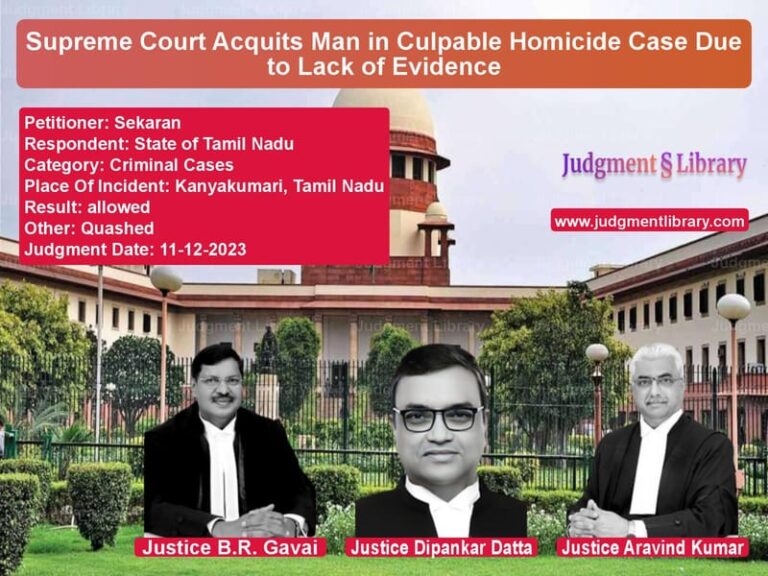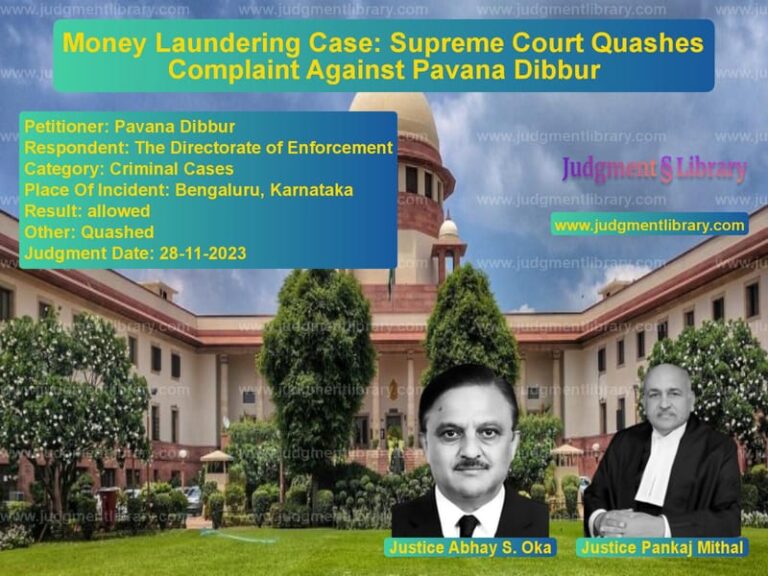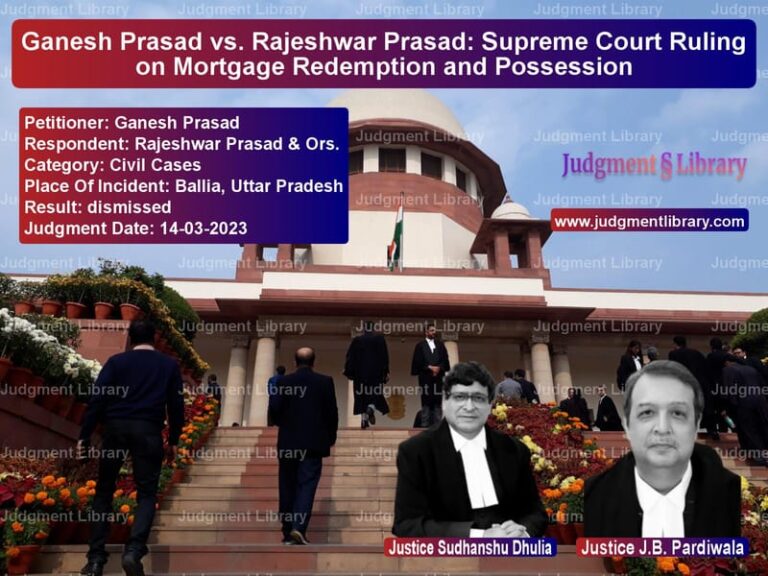Supreme Court Quashes Corruption Charges Against Jharkhand Power Official
The Supreme Court of India, on August 24, 2022, delivered a significant judgment in the case of Pushpendra Kumar Sinha vs. State of Jharkhand. The case involved allegations of corruption and financial irregularities in the Jharkhand State Electricity Board (JSEB). The appellant, Pushpendra Kumar Sinha, was accused of criminal conspiracy, fraud, and corruption under the Indian Penal Code (IPC) and the Prevention of Corruption Act, 1988. However, the Supreme Court quashed the criminal proceedings against him, ruling that there was no prima facie evidence to justify the prosecution.
This ruling highlights the importance of ensuring that allegations of corruption are backed by substantial proof before prosecuting individuals in high positions.
Background of the Case
The case originated from a contract awarded to Ramjee Power Construction Limited (RPCL) under the Accelerated Power Development Reforms Program (APDRP). The Jharkhand State Electricity Board (JSEB) awarded this contract to RPCL in 2005 for developing transmission lines.
However, due to delays in execution, a meeting was held in 2006 by the then Chairman of JSEB, Mr. Shivendu, where he orally instructed that an agenda be prepared for the termination of RPCL’s contract. Subsequently, a new Chairman, Mr. V.N. Pandey, took over in 2007 and reviewed the contract in a meeting held on February 6-7, 2007. Instead of terminating the contract, the Board decided to extend RPCL’s deadline until July 2007.
Key Allegations Against the Appellant
Pushpendra Kumar Sinha, who was serving as an Executive Engineer (Electrical) in the APDRP wing, was accused of:
- Failing to place the termination agenda before the Board.
- Preparing a note recommending an arbitrator’s appointment and waiver of penalties.
- Being part of a conspiracy to grant undue benefits to RPCL.
- Being involved in financial irregularities in the implementation of the arbitral award.
Trial Court and High Court Proceedings
The Anti-Corruption Bureau registered an FIR against the appellant and others on January 20, 2011, under various sections of the IPC and the Prevention of Corruption Act. After investigation, a charge sheet was filed on January 8, 2016, and cognizance was taken by the Special Judge on January 11, 2016.
The appellant filed a discharge application under Section 239 of the Code of Criminal Procedure (CrPC), arguing that he had no decision-making authority and had merely followed the instructions of his superiors. However, the Special Judge rejected his application on July 4, 2018. The appellant then approached the Jharkhand High Court, which dismissed his revision petition on January 6, 2020, stating that a prima facie case was made out against him.
Arguments Before the Supreme Court
Appellant’s (Pushpendra Kumar Sinha) Arguments
Senior Advocate Prashant Bhushan, representing the appellant, contended:
- The appellant was merely an Executive Engineer and had no power to make financial decisions or approve contracts.
- His actions were based on the instructions of senior officials, including the Chairman and the Advocate General of Jharkhand.
- The prosecution failed to show any illegal gratification or evidence of personal financial gain.
- Several senior JSEB officials who were involved in the contract review process were not made accused in the case.
- The Vigilance Bureau launched an inquiry only after JSEB faced financial difficulties in implementing the arbitral award.
Respondent’s (State of Jharkhand) Arguments
The prosecution, represented by the State, argued:
- The appellant did not bring the previous Chairman’s decision to terminate RPCL’s contract to the attention of the Board.
- His note dated June 8, 2007, proposing an arbitrator’s appointment, contributed to the wrongful implementation of the arbitral award.
- The accused played a role in financial mismanagement, causing a loss to JSEB.
Supreme Court’s Observations
1. No Decision-Making Authority
The Court held that the appellant had no independent power to take financial decisions:
“The appellant was not a part of the decision-making process when the JSEB reviewed RPCL’s contract. He merely followed instructions from his superiors.”
2. Failure to Prove Conspiracy
The Court found that there was no evidence of a conspiracy:
“There is no material to show that the appellant acted with fraudulent intent or was in collusion with RPCL.”
3. Lack of Financial Misconduct
The Court noted that there was no proof of financial benefit received by the appellant:
“The prosecution has failed to establish any undue financial advantage or personal gain derived by the appellant.”
4. Questionable Role of Senior Officials
The Court criticized the selective prosecution:
“It is surprising that senior officials who were part of the contract review and arbitral award implementation were not made accused, while a mid-level engineer was singled out.”
Final Judgment
The Supreme Court set aside the High Court’s ruling and quashed the criminal proceedings against the appellant:
“The appeal is allowed, and the criminal proceedings against the appellant are quashed. The appellant stands discharged.”
Impact of the Judgment
This judgment has significant implications:
- Protects officials from wrongful prosecution: Ensures that employees following orders are not falsely implicated.
- Reinforces the burden of proof in corruption cases: Mere allegations are not sufficient; concrete evidence is required.
- Highlights selective prosecution issues: Calls for accountability in cases where senior officials are excluded from prosecution.
- Strengthens judicial scrutiny of corruption cases: Courts must ensure that corruption cases are based on genuine evidence.
Conclusion
The Supreme Court’s decision in Pushpendra Kumar Sinha vs. State of Jharkhand serves as a crucial precedent in corruption-related cases. It underscores the need for strong, clear evidence before prosecuting individuals, particularly government employees who act on instructions from superiors. The ruling reinforces the principle that mere suspicion and selective prosecution cannot replace due process and concrete proof in criminal trials.
Petitioner Name: Pushpendra Kumar Sinha.Respondent Name: State of Jharkhand.Judgment By: Justice N.V. Ramana, Justice J.K. Maheshwari, Justice Hima Kohli.Place Of Incident: Jharkhand.Judgment Date: 23-08-2022.
Don’t miss out on the full details! Download the complete judgment in PDF format below and gain valuable insights instantly!
Download Judgment: pushpendra-kumar-sin-vs-state-of-jharkhand-supreme-court-of-india-judgment-dated-23-08-2022.pdf
Directly Download Judgment: Directly download this Judgment
See all petitions in Fraud and Forgery
See all petitions in Bail and Anticipatory Bail
See all petitions in Judgment by N.V. Ramana
See all petitions in Judgment by J.K. Maheshwari
See all petitions in Judgment by Hima Kohli
See all petitions in allowed
See all petitions in Quashed
See all petitions in supreme court of India judgments August 2022
See all petitions in 2022 judgments
See all posts in Criminal Cases Category
See all allowed petitions in Criminal Cases Category
See all Dismissed petitions in Criminal Cases Category
See all partially allowed petitions in Criminal Cases Category







